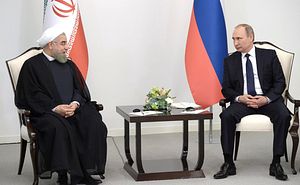After a break of several days, fighting and air strikes in the Syrian city of Aleppo have renewed. The brief ceasefire in Aleppo had been intended to allow civilians and rebels to leave the besieged eastern section of the city via eight evacuation corridors. But by the time the ceasefire expired on Sunday, only a few civilians were reported to have used a single crossing point.
The escalation of fighting is the latest blow to any prospects of a way out after every diplomatic avenue in Syria has been explored. The Russians and Iranians have rejected international calls for a ceasefire, as both countries continue to consider Bashar al-Assad’s continued rule as a “red line” in peace talks. This reinvigorated relationship has put Russia and Iran’s budding bromance under renewed focus from many analysts and commentators.
The relationship hasn’t always been a bed of roses. Tensions between Russia and Iran date back to the 19th century, when Iran lost territory to Tsarist Russia. Later, the Soviet Union supported the succession of the “Gilan Soviet Republic” at the end of World War I and Kurdistan and Iranian Azerbaijan at the end of World War II. The Soviet Union’s support for Iran’s communist Tudeh Party angered the monarchy and the theocracy alike. Moreover, Iraq was supported by the Soviet Union militarily during the Iraq-Iran War from 1980-1988. So it comes as no surprise that Russia is routinely referred to as an “unreliable partner” by official Iranian news sites. Over the years, both countries have crossed paths, With Iran viewing Russia sometimes as a colonial foe and sometimes as a convenient ally against a common enemy (the West).
But the relationship has been pursued with a renewed vigor in the last couple of years. Moscow’s annexation of Crimea in early 2014 deteriorated Russia’s relations with the West. This coupled with the nuclear deal reached between Iran and the P5+1 on July 14, 2015 created the perfect environment for this strategic romance to blossom. The nuclear deal made Iran a major stakeholder in the Middle East and emboldened Tehran to pursue its geostrategic interests in the region with aggression and fervor, leading to loggerheads with other regional states in Yemen and Syria.
Iran’s cozying up to Russia could also be attributed to the underwhelming dividends of the nuclear deal, which was prophesied as the gateway to reintegrating Iran with world markets, bringing investments and opportunities into a much-starved Iranian economy. Tehran perceives the West’s continued reluctance to reconnect Iran with global banks as a breach of the nuclear deal, which has further pushed Iran into the strategic lap of Russia. This also shows an interesting commonality in Russia-Iran relations – the warmth of this relationship is directly related to their relations with United States. Whenever relations with the U.S have taken a plunge, Russia-Iran relations have surged.
As a result of Russia’s intervention in Syria, the relations between the two states have become even more solid, which is unprecedented since the end of World War II. After the nuclear deal, the Kremlin announced that it will complete the suspended delivery of S-300 long-range surface-to-air missile systems to Iran and also stated that both countries had signed $8 billion in arms deals. The armed forces of both countries are planning and executing operations together in support of Assad’s government in Syria. Earlier this year, Russia used Iran’s Hamadan airbase to send strategic bombers into Syria in a surprise agreement, only for the deal to be abruptly annulled. Tehran was apparently not pleased with Moscow’s loud acceptance of the agreement in a televised interview; Iran later claimed that Russian use of the base was for “a specific, authorized mission and it’s over for now.”
A relationship marred by mutual mistrust and historical baggage faces serious questions about its durability. Does the Russia-Iran relationship have the potential to become a sustainable strategic alliance, which could change the geopolitics of Middle East and beyond? Or is it a relationship based on a temporary convergence of interests?
On closer inspection, one can already see some obvious contradictions in this so called “strategic alliance.” On the economic front, for example, the two have little in common. According to the Russian Federal State Statistics Service, Russian exports to Iran steadily grew from the 1990s until 2011 but have been stagnant since. Iran’s exports to Russia have increased, but remain limited. Meanwhile, Russia and Iran are the largest and the second-largest producers of natural gas in the world, respectively, and with Iran re-entering the gas market after sanctions are lifted, both countries will become bitter competitors.
Both countries also vie for influence in Central Asia – especially in the resource-rich Caspian Sea – and have not been able to agree on how to divide the Caspian Sea’s resources. Recent Iranian diplomacy should also raise some eyebrows in the power corridors of Moscow, as Iran’s approach is shaping up to be multifaceted, leaving space for a rapprochement with the West. In contrast, if the recent renewal of fighting in Syria is anything to go by, there does not seem to be any chance for a cessation of hostilities between Russia and the West in the foreseeable future.
The Russia-Iran strategic alliance is akin to an unhappy marriage where both the partners are miserable but do not want to go down the path to divorce, either. But in this case, both countries may have to go down that road sooner or later.
Umar Khan is a Researcher at Islamabad Policy Research Institute (IPRI), a think-tank based in Islamabad, Pakistan. He holds a Masters Degree in International Studies & Diplomacy from School of Oriental & African Studies (SOAS), University of London.

































